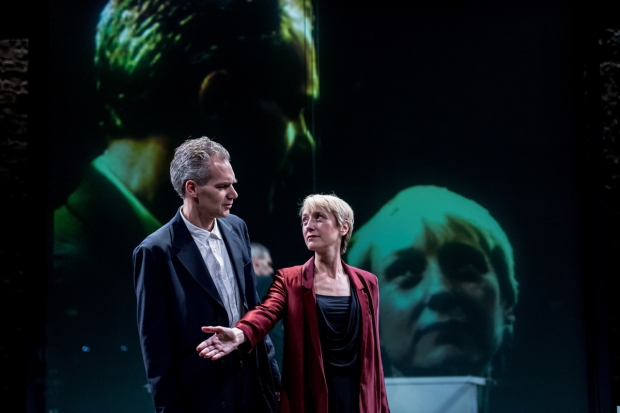Matt Trueman: Greek revivals taking theatre back to the future
What is the purpose of the recent spate of Greek revivals?

© Manuel Harlan
This is more than a mere trend. It’s not just coincidence. There is, I suspect, some underlying cultural need at play. It might just be time – 16 years after Britain’s last major Oresteia, it’s well due a revival – but it might be something else, something deeper.
Last week, Almeida AD Rupert Goold explained that the impulse behind the Greek season was the desire to examine why we make plays; to go right back to the beginning, to some of the oldest surviving dramas in the world, and ask what they’re up to and what purpose they serve. A decade ago, theatre’s energy was expansive, with companies like Punchdrunk, Shunt or Rotozaza asking what else theatre might be (or what else might be theatre). Now, it seems more introspective, focused in on the essence of the art-form, with shows stripped-back and austere.
Over the last 15 years or so, Greek tragedies have tended to appear intermittently: one every couple of years at the National, maybe another elsewhere. There’s been no particular urgency behind them, no real need to stage or see them. Where they have appeared, they have tended to come in two moulds: either big actors in big parts, with Ralph Fiennes giving his Oedipus or Christopher Eccleston his Creon, or with an emphasis on the ensemble and a chorus. Katie Mitchell, in particular, has led the way here; her Women of Troy waltzing without their partners, her bustling bureaucrats in Iphigenia at Aulis.
The tendency has been to draw out the political parallels, particularly with regards to war. That’s hardly surprising: Afghanistan, Iraq and the war on terror were the scar tissue of the noughties. We’ve seen prisoners of war and cabinet war rooms, paranoid leaders controlling their people or attempting to rebuild broken nations. Others have played on the aspects of horror: think Carrie Cracknell’s juddering chorus in Medea or Nick Payne’s dark, murderous Electra for the Gate.
'Greek tragedies function like a shot in the arm'
Key was the shift away from recreation. These were modern dress productions, suits and gowns. In 2007, Mitchell told Time Out, "There’s something about dressing actors in tunics and Jesus sandals, or about an attempt to do a reconstruction with masks, which I think distances the viewer from the reality contained in the material. You go 'Thank heavens we don’t behave like that now'."
That was, undoubtedly, a dig at Peter Hall, still the director one most associates with the ancient Greeks. He practically wrote the text book and his 1981 Oresteia remains a seminal moment in British theatre history, still revered today for its mask work and for Tony Harrison’s no-nonsense Northern verse. For years, that was what Greek theatre looked like – slavish re-enactment – and, as late as 2002, Hall was still at it, with a masked Bacchai for the National.
But theatre is a living art-form, not an archaeological one. What’s really fascinating about the glut of Greek tragedies coming our way is the range of approaches being taken. Each Oresteia will take a different tack: Robert Icke’s is stripped back and robust, a director-dramaturg’s production; a new version by playwright Rory Mullarkey at the Globe, presumably emphasising the text; at HOME, Blanche McIntyre is working with a community chorus. Expect other reinventions elsewhere. The Gate’s Medea, imported from Australia, will take a child’s eye view. NTW’s ILIAD will be a multimedia marathon. Van Hove’s Antigone just asks us to listen – to its story and to each other. He swapped masks for microphones: amplification devises both.
Form is only half the picture, though. Why tell these stories now – however we do so? Perhaps because difficult times demand feeling and Greek tragedies function like a shot in the arm. Or maybe because they’re so utterly universal, they contain truths that, in a lost historical moment, we need reminding of. Or not truths, but questions: eternal ethical dilemmas that we need to consider anew, to decide what sort of society we want to be.
Today’s theatre is really considering its function, more than it has done for a long time. Faced with straightened times and hardship, it needs to be more than mere entertainment. That was good enough for the good times, but, in the wake of a recession, it has a civic role to play. The Greeks knew that and, 2,500 years later, we’re still learning from them.

















